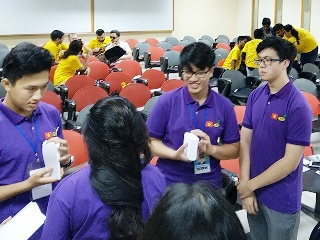| |
The world we have now is a melting pot of heterogenous individuals coming together from various segmented generations. Baby boomers are those born between 1946 to 1964, Millennials being born between 1980 to 1994, Generation Z from 1995 to 2012, and Generation Alpha from 2013 onwards. These have been coined terms to classify from which generation one is born.
In education, Gen Z is the first generation born entirely within the 21st century. Including all the others that came after that, the four walls of the classroom welcomed the 21st-century learners. With an abundance of technological advancements present in the new era, educators brush up their pedagogy and innovated strategies parallel to the needs of the new breed of learners. Learners who are entirely different from the conventional students teachers once had many years ago. Teaching styles, techniques, methods, and even instructional materials were overhauled and fine-tuned to the learning demands of the new class. The sudden shift to distance learning brought about by the COVID-19 pandemic vouched for and validated the usability, if not the effectiveness, of these.
Meticulous efforts are done to cultivate and equip the learners holistically to ensure they will thrive in todayís digitized and globalized society. Based on the framework provided by the Organization for Economic Cooperation and Development, we can derive the following
skillset
required by the future workforce industry:
▪ Literacy
▪ Communication
▪ Creativity and Innovation
▪ Critical Thinking and Problem Solving
▪ Cultural, Global, and Environmental Awareness
▪ Knowledge-Sharing, Collaboration, and Leadership
▪ Lifelong Learning, Self Direction, and Personal Management
All these are embedded in thoroughly crafted curriculums specifically designed for the learners to equally meet the demands of the future job market so the graduates can compete in a world where change is constant and learning is continuous.
21st-century learners are digital natives. They are exposed to various media from which they get knowledge and information. New technology piques their interest and would always go abuzz with great discoveries. These are also individuals who value feedback, open to change, and work on continuous self-improvements. They love being in groups and collaborating which is known not only to develop higher-level thinking skills but also to boost their self-esteem and overall self-confidence. This could be the reason why, according to Mercer (2019), thirty-three percent of millennials prefer collaborative workspaces. Additionally, thirty-one percent of baby boomers, forty percent of Generation Z, and 49% of Millenials support social tools for collaborations.
|
Certainly, knowledge-sharing and collaboration are essential skills in a connected world. Especially nowadays where everything is becoming increasingly smart, from phones to televisions. One, therefore, must actively participate in shaping an approach to build a new landscape. By working hand in hand, considering various points of view and each othersí skill sets, goals can be achieved. |
 |
|
To see the society and nation in full bloom, it needs groups of people who can come together and share their knowledge and expertise to reach a common objective or mission. 21st-century learners are design thinkers and are fully apt about the collaboration process. They see the importance of making a pool of information from people of various disciplines to ensure the creation of a shared understanding as regards a particular topic, problem, or situation. This is the modern approach.
Activities like peer-learning or teaching, brainstorming, and problem analysis discourse not only stimulate their creative and innovative minds but also forge culture and relationships. Their being exposed to a variety of opinions, personalities, practices, and mindsets make them learn from a first-hand experience. Collaborative activities open their minds to feedbacks and also approaches to feedback. This only makes any community be centered around learning and holistic development.
Companies love collaborators because they are the solution to mitigate a failure. Eighty-six percent of employees, based on Salesforce (2020), believed that lack of collaboration or ineffective communication contributes to workplace failures. This could be more crucial now that companies have shifted towards remote work brought about by an ill-threating pandemic. As employees work at a distance, all the more that they need to feel connected with the rest of the organization to ensure they are still on top of everything.
In conclusion, the skillset of 21st-century learners is central to the formation of the new society. Without these skills, we would not be able to fully realize the nationís greatest potentials. Without displaying the ability to collaborate with others and share our knowledge, we may not be able to get something done, not even started. ~ Bash Sarmiento |
|